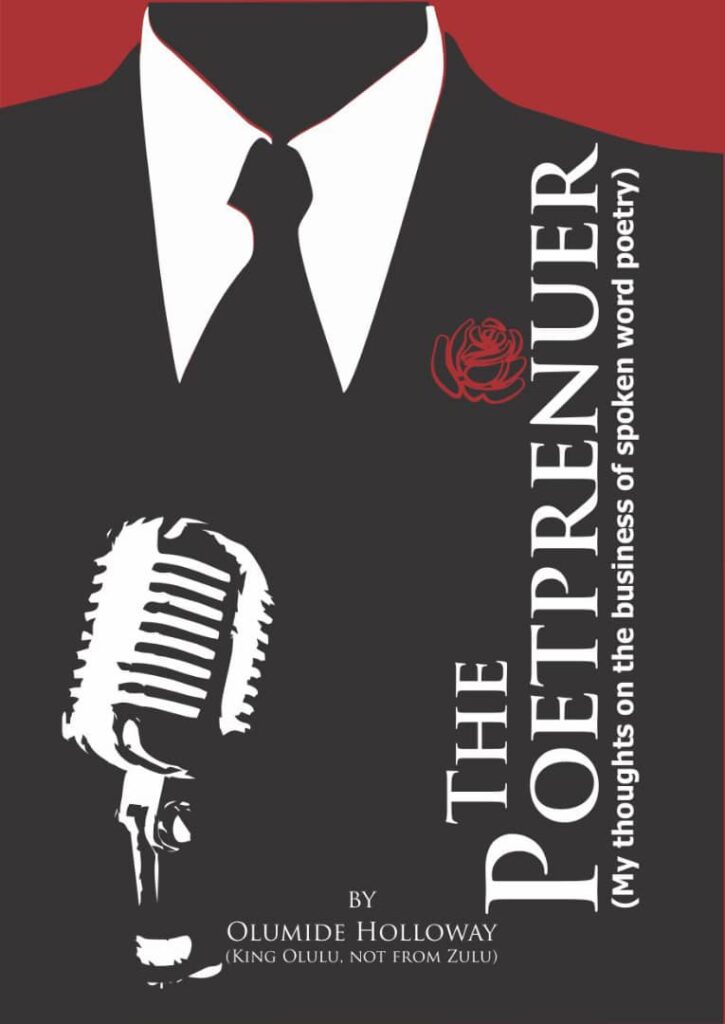- A review of Olumide Holloway’s The Poetprenuer

Book Title: The Poetprenuer (My Thoughts on Business of Spoken Word Poetry)
Author: Olumide Holloway (King Olulu, not from Zulu)
Nos of Pages: 101
Reviewer: Sogo Faloye
The poetry genre is a craft that has been largely stymied when it comes to business. In its written form, it seems unable to stretch its prolific tentacles of meaning, nuance, symbols and metaphor to greater audiences like fiction and non-fiction. Yet Olumide Holloway believes that Spoken word poetry, an eclectic sub-genre of poetry, unpacks the ability to resolve the gulf between the craft and the audience.
He asserts that because of both the performatives of its cosmopolitan nature, the resonance of the poet’s voice, and its innate musicality, spoken word poetry could be used to educate, entertain, elevate clarity on crucial social and economic subjects and still be managed effectively with clear business strategies, thereby making the poet earn a living.
The greatest challenge for creatives especially poets in Nigeria is often not the sophistry of their craft, it is the sustainability of same and the need to exchange quality experience and satisfaction for financial leverages. After all, the poet goes to the same market as the engineer, the tech consultant and the banker.

What does a spoken word poet bring to the table? Are words enough to pay the bills? While neither the advertiser, the copywriter nor the journalist may have no grief asking these questions, the poet must dig into his acumen to discover both a poet and an entrepreneur within himself. He or she must begin to engage his craft as a vehicle for widely promising implicatures including financial gain.
Therefore, Holloway delineates a clear business path through his book. There is the aspect of the poet as a brand, his poetry and his product, and his manager as his business development agent. There is the digital space and the physical space and there are oppourtunities to become a teacher, a master, and a face of national events, a voice of a ringtone,and an emotive voice of an advert placement.
He brings to the fore his vast business acumen as a former banker and business analyst and urges poet and other creators do a proper value valuation of their brand, and critically consider improving their craft with their niche audience in mind. A spoken word poet must understand his strength and weakness, and must strive to become top of mind in the competitive space.
Brand recognition and brand loyalty are crucial to the success of a poet’s journey. Lobbying for event sponsorship, retailing branded items including CDs, and constantly driving traffic to achieve regular streams, while building a tribe are germaine for the both the poet and his or her creative manager, says the author.
The book is a splendid read. The author deliberately intends for the reader to have a jotting pad and think critically about his perspectives. While interspersed with spoken word poetry revealing the struggles of a poet, it is also a robustly conversational non-fictional work that refreshes the minds of firm creative entrepreneurs while preparing emerging writers, poets, and creatives for existing loopholes, prepping them to strength their mind against the backward acculturated thought patterns that bersmich creatives from exploring both the excellence of their craft and their socioeconomic well-being (Art for Art’s sake phenomena).

Olumide ‘Olulu’ Holloway is one of the revolutionary minds in the Nigerian spoken word scene. Passionate, strategic, and prolific, he left his banking job thrusting himself fully into the craft and the business of spoken word poetry. His WordUp and War of Words grand slam were branded platforms that raised awareness of the craft and served as a network for creatives, managers, and businesspeople. On the other hand, the grand slam competition groomed the confidence of emerging voices. The book is also somewhat of a manifesto behind the brands. Inspired by Def Jam Poetry and the upsurge of spoken word hubs in Dubai, the author also reels the impressive achievements of his platforms, which gained no mean respect and traction while it ran in Nigeria. It is therefore no surprise that these ideas have morphed into his new platform, poetreel.com, despite being in the Diaspora.
As a business analyst, the author laid bare the opportunities, the market value, the challenges, and the leverages within the Nigerian creative space and implored poets to explore the possibilities. No doubt, Nigerians are some of the most educated people in Africa, and in the Diaspora, of the 220 million Nigerians in the country, all creative enterprises or any business need to just 5 per cent of the population to become a national powerhouse. Although the author admits that a lot needs to be done, he is optimistic that the genre is growing in leaps and bounds.
A constant aspect of the book that the author repeats is the fact that spoken word poetry contributes immensely to literacy, to memory, to discourse and provides entertainment without the replete soft porn that has pervaded the Nigerian entertainment industry. Therefore, it can straddle educational institutions at all levels, open for all kinds of festivals, feature on traditional media, in conferences, and serve its purposes in boardrooms and offices.

In the chapter, ‘How companies can make money from poetry events’ the author reveals plausible ideas for the telecom, Fast Moving Consumer Goods companies, and hints on how this can help companies can grow a viable customer base from an already captured niche of art lovers.
The author is also fond of using extended metaphors and allusions to explicate business lessons. For example, he deploys the negotiation between Laban and Jacob to reflect the need to grow from a mere employer of labour to a partnership. He also urges creatives to deploy their strength into well-thought-out paths before the seasons turn gray and cold.
Also, one crucial lesson that the author constantly harped on is that creative businesses and all businesses must endeavour to provide memorable experiences for their customers to retain them. The author is filled with buoyant ideas of such gestures and services that can help business earn the customers trust and love.
Warning, there are times when the author roams out of the fulcrum of the discourse and begins to philosophise about personal life lessons. While this may seem problematic for many readers, one must understand that writing about the business of poetry for the author comes from an experiential spectrum. Therefore, there are unspoken stories and jocular experiences that conceal real life events. Yet they do not displace clarity on commentaries on discipline and the importance information gathering.
There are also aspects that read like a memoir, especially the tough and nerve-wracking sacrifices made as a young Nigerian and as a Nigerian in a creative space bereft of adequate funding. Yet the restless creative is resolved not to be defeated by challenges, neither is he willing to bask too long in his victories. The author’s attempts to achieve balance between being a husband, a father and being a dreamer is also a memorable chapter to read. In a country replete with shattered homes and dreams deferred, it will take a resilient ‘utility player’ and a competent ‘team player’ to keep the dream alive without losing touch with home.
Olumide is a thinker that loves to break complex business ideas into morsels of simplicity. Creative writers, poets, and entrepreneurs would be invigorated by great lessons in the book.
Sogo Faloye is a writer, a technology consultant, and a senior partner at Fairchild Media, a leading media and content development firm. He lives in Ibadan, Nigeria. [email protected] , +2347084862698.
Share your story or I Witness Reports with us 24/7 via SMS/Whatsapp: +234(0)8072022024, Email: [email protected], follow us on our social media platforms: X (formerly Twitter), Instagram, Facebook: @Gatmash, and subscribe to our YouTube channel: Gatmash TV.
Gatmash News is one of the most sought-after news portals, with an increasing audience and exclusive breaking news and reports across the globe. Plus more. Website: https://gatmash.com
For ad placement, contact us today via email at [email protected] or call our hotlines at +234(0)8072022024.





